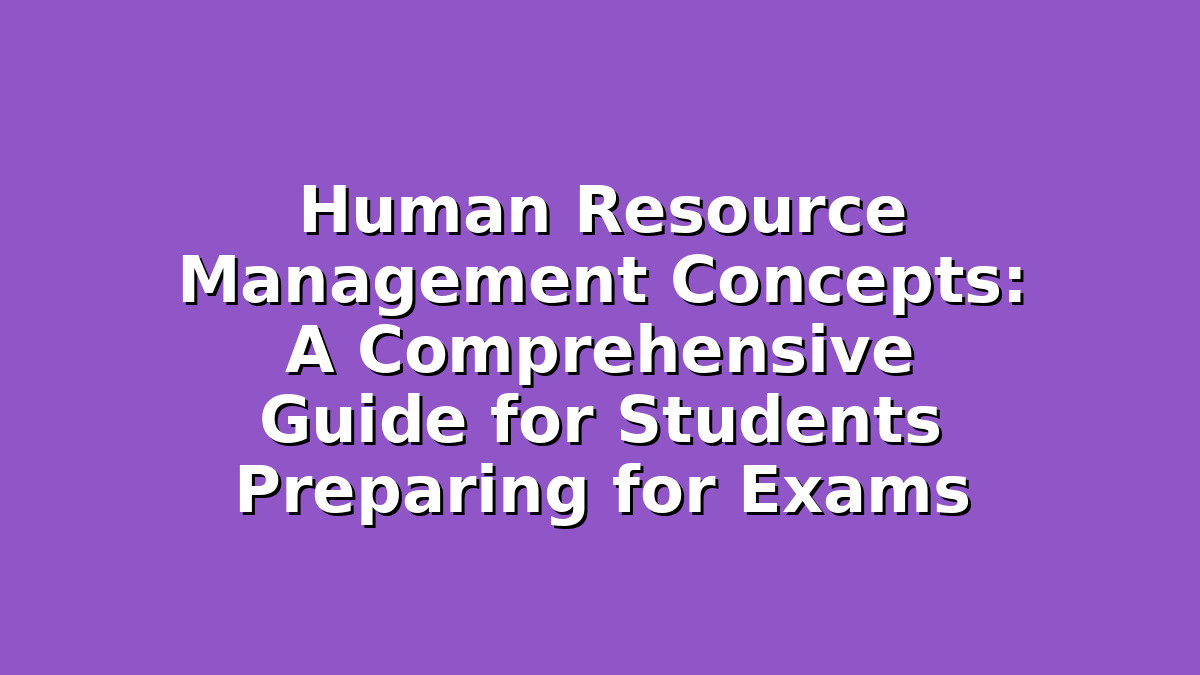Preparing for exams can be challenging, especially when it comes to subjects like Human Resource Management (HRM) that involve a mix of theory and practical applications. Whether you’re a business student, aspiring HR professional, or simply looking to strengthen your understanding of HR concepts, mastering the fundamentals is crucial. This comprehensive guide will walk you through key Human Resource Management concepts and provide effective study tips to help you excel in your exams with confidence.
Introduction to Human Resource Management
Human Resource Management refers to the strategic approach organizations take to manage their workforce effectively. HRM covers a broad range of functions including recruitment, training, performance management, employee relations, and compliance with labor laws. As a student, understanding these core areas not only helps in exams but also builds a foundation for future career success.
HRM is often described as the backbone of any organization because it ensures that the right people are hired, developed, and retained to meet business goals. For exam preparation, it’s essential to break down these concepts into manageable sections and relate them to real-world practices.
—
Section 1: Core Functions of Human Resource Management and How to Study Them
Key Concepts: Recruitment and Selection, Training and Development, Performance Management, Compensation and Benefits
One of the first steps in HRM is understanding the core functions that keep an organization running smoothly. These areas often form the basis of many exam questions, so mastering them is vital.
– Recruitment and Selection: This involves attracting the right candidates and choosing the best fit for the company. Focus on studying different recruitment methods (internal vs. external), selection tools (interviews, tests), and legal considerations.
– Training and Development: Employees need continuous learning opportunities to improve their skills. Learn about various training methods, the importance of orientation programs, and the concept of career development plans.
– Performance Management: This function is about evaluating employee performance and providing feedback. Understand performance appraisal techniques, setting SMART goals, and handling underperformance.
– Compensation and Benefits: This covers how organizations reward employees through salary, bonuses, and benefits. Study pay structures, incentive schemes, and employee welfare programs.
Study Tip: Create flashcards for each function with definitions, examples, and key terms. Use real-life case studies from your textbook or online resources to see how these functions operate in actual companies. Teaching these concepts to a peer or even recording yourself explaining them can reinforce your understanding.
—
Section 2: Important HRM Theories and Models for Exam Success
Key Concepts: Maslow’s Hierarchy of Needs, Herzberg’s Two-Factor Theory, McGregor’s Theory X and Theory Y, The HR Cycle
Theoretical frameworks are a backbone of HRM studies. Exams often ask you to explain or apply these theories to workplace scenarios, so it’s important to grasp their key points and implications.
– Maslow’s Hierarchy of Needs: Understand how employees are motivated by different needs, ranging from basic physiological needs to self-actualization. Be able to identify examples of each need in workplace settings.
– Herzberg’s Two-Factor Theory: This theory distinguishes between hygiene factors that prevent dissatisfaction and motivators that drive satisfaction. When studying, focus on how companies can use this theory to improve employee morale.
– McGregor’s Theory X and Theory Y: These contrasting views describe management attitudes toward employees—whether they are inherently lazy (Theory X) or self-motivated (Theory Y). Learn how these theories influence leadership styles.
– The HR Cycle: Familiarize yourself with the stages of HRM from planning to recruitment, training, appraisal, and separation. This helps you understand how HR functions interconnect.
Study Tip: Use diagrams and charts to visualize these theories. Drawing Maslow’s pyramid or the HR cycle can help you recall details quickly during exams. Practice writing short paragraphs that explain these theories in your own words, and try to relate them to personal experiences or current workplace examples.
—
Section 3: Effective Study Strategies for HRM Exam Preparation
Preparing for HRM exams requires more than memorization. Here are some proven techniques to help you study smart and retain information longer:
– Active Learning: Instead of passively reading your notes, engage with the material by summarizing chapters, creating mind maps, or forming study groups. Discussing HRM concepts with peers helps deepen your understanding.
– Practice Past Exam Papers: Familiarize yourself with the format and types of questions asked in previous exams. Time yourself while answering to build speed and accuracy.
– Use Mnemonics and Acronyms: To remember complex theories or lists, create mnemonics. For example, using “PERFORMANCE” to stand for key appraisal criteria can make recall easier during exams.
– Make Real-World Connections: Link theoretical concepts to current events or known companies. For example, relate employee motivation theories to how popular corporations like Google or Apple manage their workforce.
– Schedule Regular Breaks: HRM involves absorbing a lot of information. Use the Pomodoro technique (25 minutes study, 5 minutes break) to keep your mind fresh and avoid burnout.
– Ask for Clarification: If certain concepts confuse you, don’t hesitate to ask teachers or use online resources like videos and discussion forums. Sometimes a different explanation can make things click.
—
Conclusion
Human Resource Management is a fascinating and dynamic field that plays a crucial role in the success of any organization. For students preparing for exams, focusing on core HR functions, understanding foundational theories, and adopting effective study strategies can make a significant difference. Remember, consistency and active engagement with the material are your best allies.
Approach your HRM studies with curiosity and confidence. Practice regularly, seek help when needed, and try to connect theoretical knowledge with real-life examples. With the right mindset and preparation, you can master HRM concepts and ace your exams.
Good luck, and keep pushing forward!
—

Responses